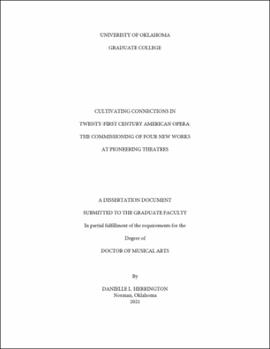| dc.description.abstract | This study investigates selected pioneering American opera theatres and four world premieres from 2000-2019, shedding light on prodigious commissioning histories and twenty-first century new works initiatives of four institutions: Houston Grand Opera, Minnesota Opera, Opera Theatre of Saint Louis, and Santa Fe Opera. During the first two decades of the twenty-first century, non-profit opera institutions, amidst radical social and technological change, began commissioning and producing new operas at a remarkable rate. Through this increase, enthusiastic commitments by many leading companies have led to evolving commissioning practices that emphasize collaboration. To examine these trends, I employ a multimodal methodology that intersects opera studies, performance studies, reception history, and ethnographic practices. This interdisciplinary approach presents opera as a lived experience, illuminating influential cultural agents from this recent past, including directors Allison Felter, Anthony Freud, Paul Kilmer, Dale Johnson, Charles MacKay, Kevin Newbury, Timothy O’Leary, Eric Simonson, and Patrick Summers. Analysis of repertory archival data and institutional interviews indicate contemporary opera creation is concerned with impacting audiences through familiar dramaturgy.
To study commissioning and reviving practices, four case studies were selected from these theatres’ new works archives for their multiple productions and cultural narratives. Spanning the two decades, the commissions are Dream of the Pacific (Stephen Mager/Elkhanah Pulitzer; OTSL 2004), The Grapes of Wrath (Ricky Ian Gordon/Michael Korie; MO 2007), Three Decembers (Jake Heggie/Gene Scheer; HGO 2008), and The (R)evolution of Steve Jobs (Mason Bates/Mark Campbell; SFO 2017). Four chapters of the dissertation recount the genesis of each new opera and its collaborative processes. Moreover, notable scenes, reception, and revivals are evaluated to discern what dramatic, aural, social, and economic elements culminate in a new opera’s cultural resonance and sustained success. The four case studies consist of memorable motives and polystylistic idioms to enhance the dramaturgy. Though they vary in content and creation, each follows a transhistorical journey that exemplifies the notion of opera that is timely yet timeless. My study, therefore, asserts revived twenty-first century new works consist of socially-relevant stories in the hopes of cultivating meaningful connections with prospective operagoers. | en_US |

